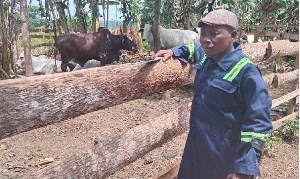By Dr Kofi Ansah
The notion that living abroad renders you unfit to comment on or criticise the affairs of Ghana has been around for as long as I can remember. I was reminded of it recently when someone writing under a pseudonym commented on my last published article earlier this month ("A look from Down Under: the story behind the electric fence"). A related view is that you need to be on the ground, physically within Ghana's borders, to be able to make a meaningful contribution to the country. Regrettably, I have come across a few Ghanaians in the diaspora who share the latter view.
The no-right-to-comment line of argument is often used in an opportunistic attempt to shut out Ghanaians living abroad from debate or to simply spite them. Even if you moved back home after a period of residence overseas, you would forever be "tainted" in the eyes of some cynics. If you became active in politics, for example, you would have to continually fend off malicious accusations from your political foes about your period of absence from the country: that you are somehow guilty of abandoning your homeland for greener pastures; that you had run away when you were supposed to stay back and help build the nation; among other strictures.
Such views are, at best, parochial and, in many cases, populist in intent. They are designed to appeal to the prejudices of those who are unable to grasp the big picture and people with begrudging aversion to Ghanaians in the diaspora. They disregard Ghanaian political and social history and ignore the many positive and beneficial impacts that the current diaspora population has on Ghana and its people.
Assuming all or the majority of Ghanaians living abroad moved back to Ghana, would the country become significantly better off? Or, if every single soul born in Ghana remained in Ghana and spent all or most of their working life there, would Ghana by now be a developed country or an upper-middle-income economy? Well, that is what the detractors of the Ghanaian diaspora seem to suggest. In my view, this is a warped sense of patriotism and belongs in earlier centuries, not in the 21st. The doctrine of "patria o muerte" (homeland or death) à la Castro and Guevara doesn't stack up against a globalised world full of varied and widely dispersed opportunities, nor does it measure up to the needs of contemporary society.
If people can only make a contribution to their country by staying put, then the same argument can be made on other geographical or place-of-origin grounds. People born in Ghana's north, south, east or west should remain in their regions to help them develop. Those born in the villages should follow the same principle. In my case, I'd have returned to my small country town, Adawso Akwapim, after completing my degree at Legon, got a job there, and helped eradicate poverty or improve literacy among the townsfolk. My roommate Peter (aka Pierro) should be working in Navrongo, not in Takoradi; and my friend and former colleague Dr Osei-Amo in Seniagya, not in Canberra. That is the vision of our utopian detractors.
Throughout human history, migration has occurred in one form or the other, for good or for bad. Critics of the Ghanaian diaspora shouldn't be surprised to find their ancestors had originated from another place outside what we now know as Ghana. The interaction between different societies as a result of migration can be a catalyst for positive change in both the country of origin and the destination country. If nothing else, today, a good number of Ghanaian children, young adults and other citizens are in school or college, are appropriately clothed and fed, have a roof over their head, can receive medical treatment or are participating in an economic activity thanks to the financial support they receive from their relatives in the diaspora. The Government of Ghana cannot help them meet their needs; and many of those relatives would not have been able to help if they had remained in Ghana. The more than $151 million in remittances that was sent to Ghanaian households in 2011 is not just a number; it is a significant contribution to the economic and social wellbeing of Ghanaians at home. This is before factoring in the benefits from the millions of dollars in undocumented remittances sent through informal means.
I do not discount the economic and social cost that large departures of highly educated and skilled people can impose on a country like Ghana. A brain drain of specialists such as medical practitioners and other people with technical knowledge can particularly be hard on the source country. There is also a strong case for beneficiaries of Ghana Government scholarships to return home to fulfil their post-overseas studies obligations. However, Ghana continues to produce hundreds of graduates only to see them join the struggling unemployed or underemployed ranks. Most unemployed or impoverished Ghanaians (and non-Ghanaians) will jump at any opportunity to improve their economic circumstances, be it in their homeland or abroad; it is only a natural and rational response to a critical need.
The skills and capacity for nation building are not the special preserve of people who are native to a particular land. Australia, New Zealand, Canada and the US did not develop as a result of their native inhabitants remaining in situ. They were built and continue to be developed by migrants from all over the world. In Ghana, there are South Africans, Nigerians, Australians and other nationals investing in the local economy and helping to make Ghana a better place, while fulfilling their individual or corporate objectives. Should they have remained in their homeland? The economic and cultural interdependence of countries around the world is such that knowledge sharing, trade, and movement of capital and investment would not be possible if countries continued to view nation building through the old-fashioned patriotic lens. That is a method for dystopias.
Leaving your homeland for another land shouldn't disenfranchise you completely; it shouldn't take away your right to comment on or criticise its affairs. In fact, you are ideally placed to compare two different systems and offer constructive criticism and suggestions. In this age of digital communication, members of the Ghanaian diaspora are as well informed on Ghana's domestic issues as anyone else living in Ghana. The ideas put forward in various forums in the diaspora are part of the contribution towards making Ghana a better place. Ghanaian political leaders and public officials who are impervious to advice and criticism from others, including Ghanaians in the diaspora, are captive to their own blinkered view of the world and will make the rest of the population suffer for their narrow-mindedness.
If there was any stigma to being in the diaspora, I would wear it gladly, without feeling any sense of betrayal to my homeland.
Dr Kofi Ansah Australian Capital Territory Email: kbaansah@gmail.com November 2013
Opinions of Saturday, 23 November 2013
Columnist: Ansah, Kofi














